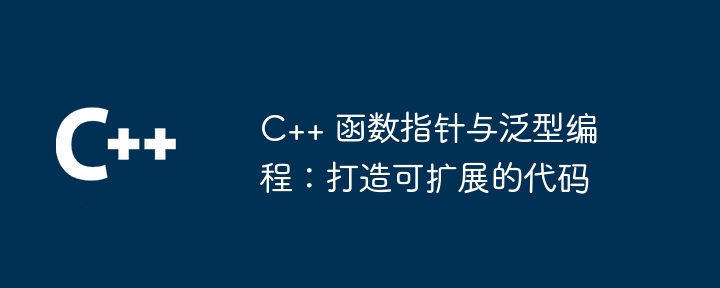
In C, function pointers allow us to handle functions as arguments and create generic code. Combined with generic programming, we can create a function pointer using type parameters and then use it to call functions of different data types. This way, we can create scalable and flexible code and avoid writing duplicate code for different data types.

A function pointer is a kind of pointer. Points to a function. By using function pointers, we can pass functions as arguments and handle them in a similar way to other variables. In C, the syntax of a function pointer is as follows:
typename (*function_pointer)(parameters);
Generic programming is a technique for operating different data types with common code. Using generics, we can write functions or classes once and instantiate them using various data types. Generic code uses type parameters, usually represented as letters, such as T or U.
Function pointers and generic programming can be used together to create highly flexible and scalable code. We can create a function pointer using generic type parameters and then use it to call different functions based on different data types.
Let us consider a function that compares two numbers. We can use function pointers and generic types to create a universal comparison function that can compare any data type:
template<typename T>
int compare_func(T a, T b, int (*comparison_function)(T, T))
{
return comparison_function(a, b);
}Now we can use this function pointer with different comparison functions, for example:
// 定义比较函数
int compare_int(int a, int b) { return a - b; }
int compare_float(float a, float b) { return a - b; }
// 使用泛型函数指针
int result = compare_func(10, 20, compare_int);
float result2 = compare_func(1.5f, 2.5f, compare_float);This approach provides some advantages:
The above is the detailed content of C++ Function Pointers and Generic Programming: Creating Scalable Code. For more information, please follow other related articles on the PHP Chinese website!
 What are the differences between c++ and c language
What are the differences between c++ and c language
 Recommended learning order for c++ and python
Recommended learning order for c++ and python
 Cost-effectiveness analysis of learning python and c++
Cost-effectiveness analysis of learning python and c++
 Is c language the same as c++?
Is c language the same as c++?
 Which is better to learn first, c language or c++?
Which is better to learn first, c language or c++?
 The difference and connection between c language and c++
The difference and connection between c language and c++
 C++ software Chinese change tutorial
C++ software Chinese change tutorial
 Cost-effectiveness analysis of learning python, java and c++
Cost-effectiveness analysis of learning python, java and c++




